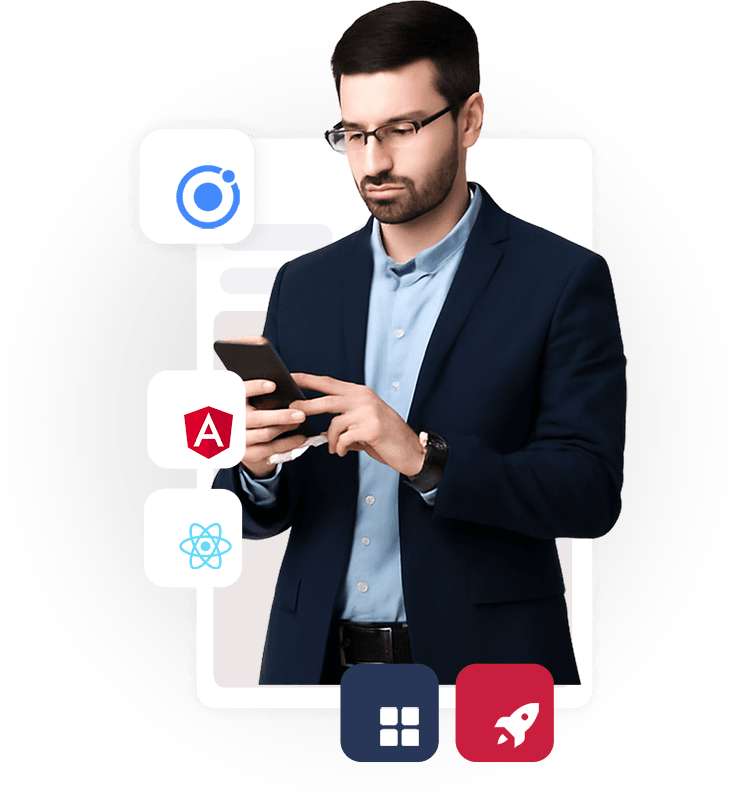
Top CI/CD Tools for Scalable Web Apps
Read how CI/CD streamlines code integration, testing, and deployment—boosting speed, quality, and scalability in modern software development.
Tailored developers for your needs
100% satisfaction guaranteed
Scalable teams, fast delivery
Flexible hours, seamless updates
Secure, cost-effective solutions
Dedicated project managers

Leverage the power of HTML, CSS, and JavaScript to create mobile applications that run across multiple platforms.
This approach significantly reduces development time and costs by utilizing existing web development skills.
Develop applications that provide a consistent user experience on all major mobile operating systems, ensuring wider audience reach.
Design for scalability from the outset, allowing your app to grow alongside your user base.
Customized Ionic solutions built to your precise specifications, delivering unique and powerful mobile apps.
Cross-platform expertise with Ionic
Scalable, efficient processes
Rapid project delivery
Seamless, high-performance solutions
Customizable development
Easy system integration

Our Ionic experts build cutting edge hybrid apps using a powerful combination of web technologies and native capabilities.
The team delivered high quality work that met our expectations in terms of design and functionality.
We help you access skilled, reliable Ionic Developers who bring clarity, speed, and scalability to your projects — so you can focus on results, not resourcing.
Dappinity provides expert Ionic Developers offering scalable, innovative, and client-focused solutions while ensuring high quality and timely project delivery.
The dedicated Ionic Developers team at Dappinity delivers innovative, scalable, and secure solutions, ensuring seamless collaboration and future ready applications.

Tell us what you need - tech stack, experience, timelines.

We send you pre-screened developers matched to your needs.

You interview. You decide. Start in as little as 72 hours.

Easily scale up or down. We stay flexible as you grow.
Choosing the right engagement model when hiring Ionic developers is essential for ensuring your project’s success while optimizing costs. Here’s an overview of the various engagement models for Ionic development:
Full-time Ionic developers are ideal for long-term projects that require consistent development, such as building large-scale mobile apps with complex functionalities. Whether you're developing a cross-platform app for iOS, Android, and the web, or a feature-rich enterprise solution, full-time developers can offer dedicated support throughout the development process.
Part-time Ionic developers work well for projects that need periodic attention, such as ongoing updates, bug fixes, or adding new features. If you already have an app in production and only need occasional updates or improvements, part-time developers can be a cost-effective solution.
Hourly Ionic developers provide flexibility, making them a great choice for specific tasks like implementing a single feature, debugging an issue, or optimizing an existing app. Hourly engagement allows you to only pay for the actual hours worked, which is useful for smaller, well-defined tasks.
Project-based Ionic developers are a good choice when you have a clearly defined project with specific deliverables and deadlines. Whether you're developing a new mobile app, creating a web app with Ionic, or integrating a third-party service, project-based developers will focus on achieving the set goals within the agreed timeline.
Adopting the right development methodology ensures that your Ionic project is delivered on time, within scope, and to the highest quality standards. Below are the best development methodologies for Ionic projects:
Agile is a great methodology for dynamic Ionic projects where requirements may evolve during the development process. It’s ideal for mobile apps where frequent feedback, continuous delivery, and regular iteration are necessary. With Agile, developers can quickly implement changes and new features while maintaining a steady pace of progress.
Scrum is an Agile framework that divides the work into sprints, typically lasting two weeks, where specific deliverables are completed. This methodology is ideal for larger Ionic projects, particularly those with multiple features, integrations, or complex user interactions. Scrum enables efficient project management, with clear goals for each sprint, making it suitable for fast-paced mobile app development.
Waterfall is a more rigid, traditional approach that is best suited for smaller, simpler projects where the requirements are stable and well-defined. If you're building a basic mobile app with a fixed set of features, the Waterfall methodology can work well. However, for larger, evolving projects, Agile or Scrum would be more appropriate.
Ionic developers bring a range of skills to meet your project’s tech stack requirements. Here’s how Ionic fits within modern mobile development ecosystems:
Ensuring high-quality code is key for building scalable, maintainable, and bug-free Ionic applications. Here’s how Ionic developers ensure code quality:
Code reviews are an essential part of the development process, ensuring adherence to best practices, consistency in code style, and the use of design patterns. Regular reviews help catch bugs early, improve code readability, and maintain standards.
Ionic developers write automated tests using popular testing libraries such as Jasmine and Karma to catch potential issues early. Automated tests help ensure that each app component and feature is working as expected, providing better stability during development.
Continuous Integration (CI) and Continuous Deployment (CD) are vital to modern development workflows. Ionic developers use tools like GitHub Actions, Bitrise, and Jenkins to automate build, test, and deployment processes, ensuring that code is always in a deployable state and reducing the chances of errors.
Tools like ESLint and Prettier help Ionic developers maintain consistent code formatting and follow best practices. Linting identifies potential issues, such as unused variables or syntax errors, while formatting ensures code readability and uniformity across the project.
When hiring Ionic developers, ensuring the security of your app and protecting intellectual property (IP) is essential. Here's how to ensure security and IP protection:
Make sure your Ionic developers sign Non-Disclosure Agreements (NDAs) to protect sensitive information about your project. NDAs should include confidentiality clauses to prevent unauthorized sharing of proprietary information. Additionally, legal contracts should clearly define the ownership of code and intellectual property.
Ionic developers typically use version control platforms like GitHub, GitLab, and Bitbucket to manage source code. Make sure you use private repositories and enable two-factor authentication (2FA) to protect your project’s codebase.
Role-based access control (RBAC) ensures that only authorized individuals can access specific parts of your project. Limiting access to the codebase based on roles and responsibilities minimizes the risk of unauthorized access.
Clearly define ownership of the Ionic app and any code or assets produced in your legal agreements. Use “Work for Hire” clauses to ensure that the developer transfers full ownership of all app-related IP to your business.
Choosing between a freelancer and a dedicated Ionic developer depends on the complexity and scope of your project. Here's a breakdown of each option:
Freelancers are a good fit for smaller projects or short-term tasks, such as building a prototype, implementing a new feature, or fixing bugs. Freelancers are typically more cost-effective and can be quickly hired for one-off jobs or specific tasks.
Dedicated Ionic developers are best for larger, more complex projects, such as building enterprise-level mobile apps, cross-platform solutions, or apps with frequent updates. A dedicated developer offers ongoing support, better collaboration, and a deeper understanding of your app’s long-term vision.
Whether you're launching a hybrid mobile MVP or scaling your enterprise application across platforms, Dappinity’s Ionic developers deliver fast, reliable, and scalable solutions. From UI rich designs to secure backend integrations, our experts ensure your Ionic app is ready for real-world success.
 Transparency
Transparency Strict Privacy Assurance with NDA
Strict Privacy Assurance with NDA Talented Team of Developers
Talented Team of Developers 12 Months Free Support
12 Months Free Support Smooth Collaboration & Reporting
Smooth Collaboration & Reporting On time Delivery, No Surprises
On time Delivery, No Surprises Efficient & Adaptive Workflow
Efficient & Adaptive WorkflowWe bring deep expertise in hybrid mobile development with Ionic, building apps that are fast, scalable, and user-friendly across Android, iOS, and the web. You get complete transparency, full-cycle development, and support from day one.
Our developers build a wide range of applications—from MVPs and customer portals to enterprise-grade apps and e-commerce platforms.
We can allocate skilled Ionic developers within 24–48 hours based on your specific requirements and engagement model.
Absolutely. We specialize in integrating third-party services, using native plugins, and developing custom plugins with Capacitor or Cordova.
Yes. Our maintenance packages cover bug fixes, version updates, security patches, and performance monitoring.
Yes. You’ll have full control over the developers you hire, with direct communication and collaboration throughout the project.
Definitely. We implement lazy loading, optimize code, and reduce memory usage to ensure top performance across devices.







